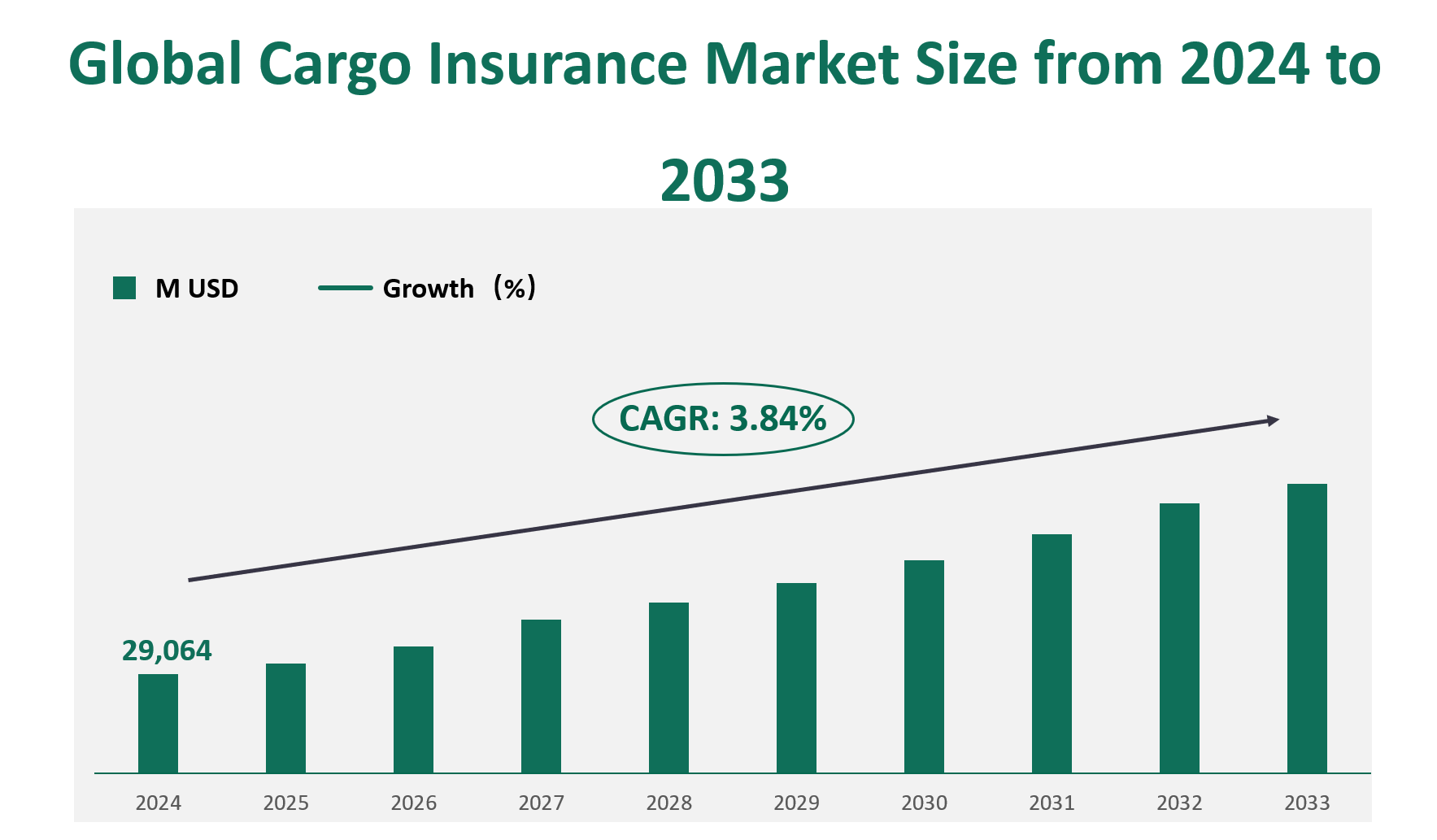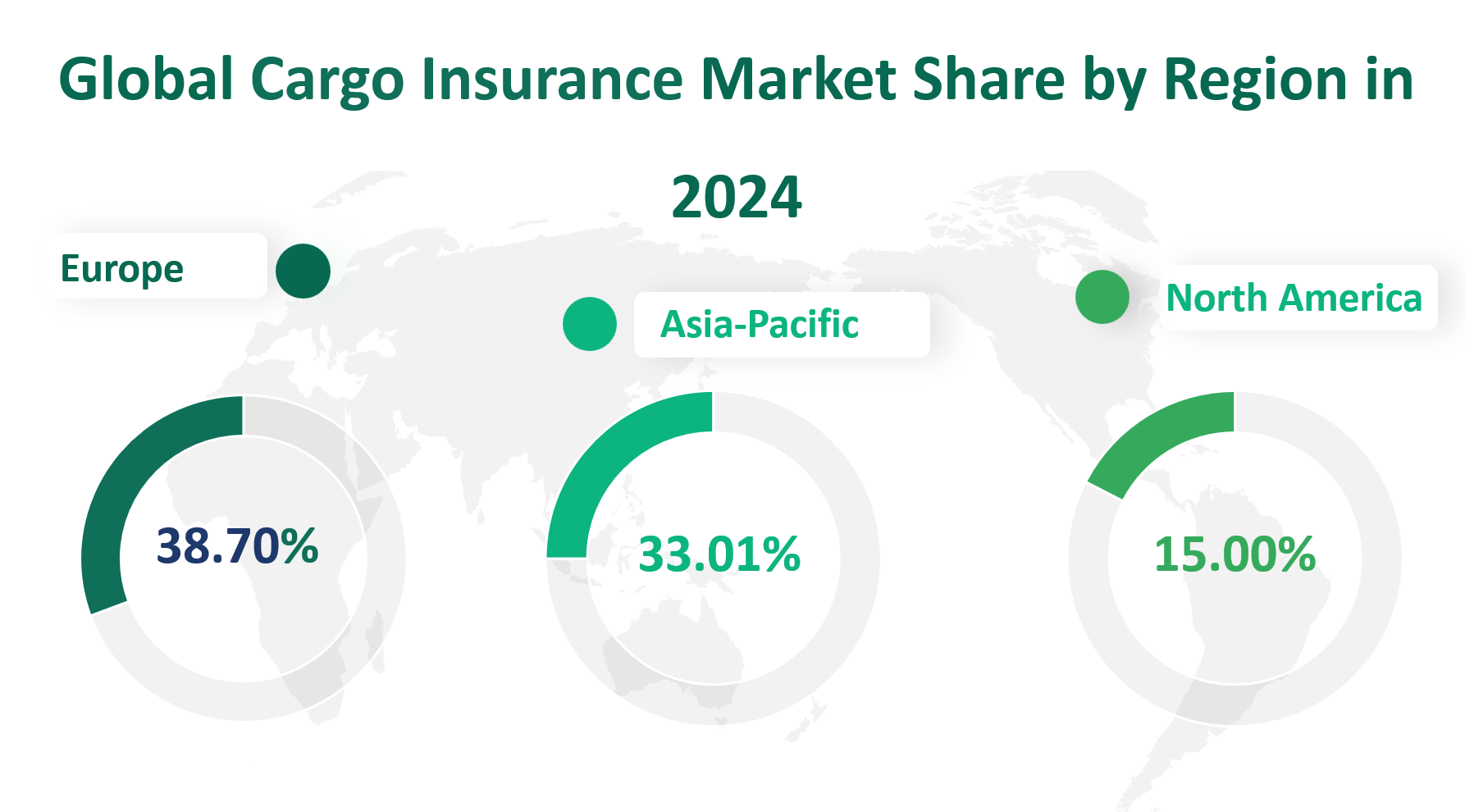1. Global Cargo Insurance Market Insight Analysis
In 2024, the global total Gross Premiums Written (GPW) for cargo insurance is forecasted to reach $29,064 million, with a Compound Annual Growth Rate (CAGR) of 3.84% from 2024 to 2033.
Cargo insurance is a specialized form of insurance that covers goods during transportation, whether by land, sea, or air. It provides financial protection against potential losses or damages that may occur during transit. The insurance can cover a wide range of risks, including natural disasters, theft, accidents, and other unforeseen events. Cargo insurance is essential for traders, logistics companies, freight forwarders, and cargo owners, as it helps mitigate the financial impact of disruptions in the supply chain.
Figure Global Cargo Insurance Market Size (M USD) and CAGR (2024-2033)

2. Driving and Limiting Factors of Cargo Insurance Market Growth
The growth of the cargo insurance market is driven by several key factors. Firstly, the expansion of global trade and the increasing complexity of supply chains have heightened the demand for cargo insurance. As businesses expand their operations across borders, the need to protect goods in transit becomes more critical. The rise of e-commerce has also played a significant role in driving demand, as online retailers require robust insurance solutions to safeguard their shipments.
Technological advancements have further propelled the market forward. The adoption of digital technologies, such as the Internet of Things (IoT), artificial intelligence (AI), and blockchain, has enabled more efficient risk assessment and management. These technologies provide real-time tracking and monitoring of shipments, allowing insurers to offer more customized and responsive insurance products.
However, the market also faces several limiting factors. One of the primary challenges is the increasing regulatory scrutiny and compliance requirements. Governments around the world are imposing stricter regulations on the insurance industry, which can increase operational costs and complexity. Additionally, the market is highly competitive, with numerous players vying for market share. This competition can lead to price wars and reduced profitability for insurers.
Another limiting factor is the economic environment. Economic downturns and fluctuations in global trade can reduce the demand for cargo insurance. Companies may cut back on insurance coverage during economic hardships, opting to save costs. Moreover, the ongoing COVID-19 pandemic has disrupted supply chains and led to a temporary decline in trade volumes, impacting the cargo insurance market.
3. Technology Innovation and Corporate Mergers and Acquisitions in Cargo Insurance Market
The cargo insurance market is experiencing significant technological innovation, driven by the need for more efficient and effective risk management solutions. Big data analytics, AI, and machine learning are being used to enhance risk assessment and pricing models. These technologies enable insurers to analyze vast amounts of data to identify patterns and trends, allowing for more accurate predictions of potential risks.
Blockchain technology is also being adopted to improve transparency and security in the supply chain. By creating immutable records of transactions, blockchain can help reduce fraud and enhance trust among stakeholders. IoT devices are being used to track shipments in real-time, providing insurers with valuable data on the condition and location of goods during transit.
In addition to technological advancements, the market has also seen a wave of corporate mergers and acquisitions (M&A). These activities are driven by the need for companies to expand their market reach, diversify their product offerings, and enhance their technological capabilities. For example, major players such as Allianz, Ping An Insurance, and Liberty Mutual have been actively involved in strategic partnerships and acquisitions to strengthen their positions in the global market.
4. Global Cargo Insurance Market Size by Type
Cargo insurance is categorized into three primary types: Marine Cargo Insurance, Land Cargo Insurance, and Air Cargo Insurance.
Marine cargo insurance is the most prevalent type of cargo insurance, covering goods transported by sea. It protects against losses and damages caused by natural disasters, accidents, and other perils of the sea. According to the report, marine insurance accounted for the largest market share in 2024, with Gross Premiums Written (GPW) estimated at $19,673 million. This type of insurance is essential for international trade, as the majority of global cargo is transported via maritime routes.
Land insurance covers goods transported by road or rail. It protects against risks such as theft, accidents, and natural disasters during transit. In 2024, the GPW for land insurance was projected to be $7,435 million. This type of insurance is particularly important for landlocked countries and regions where maritime transportation is not feasible. The growth of e-commerce and the increasing demand for fast and reliable delivery services have further emphasized the need for robust land insurance.
Air insurance covers goods transported by air, providing protection against risks such as crashes, hijacking, and other airborne perils. The GPW for air insurance in 2024 was estimated at $1,956 million. While air cargo represents a smaller portion of the overall market, it is crucial for high-value and time-sensitive shipments. The rapid growth of global trade and the increasing demand for expedited delivery options have driven the need for comprehensive air insurance.
Table Global Cargo Insurance Market Size by Type in 2024
Gross Premiums Written (M USD) 2024 | Market Share | |
| 19673 | 67.69% |
| 7435 | 25.58% |
| 1956 | 6.73% |
5. Global Cargo Insurance Market Size by Application
The applications of cargo insurance are diverse, catering to various sectors and stakeholders in the supply chain. The primary applications include traders, logistics companies and freight forwarders, cargo owners, and other related entities.
Traders are among the largest beneficiaries of cargo insurance. They rely on these policies to protect their investments and mitigate risks associated with transporting goods across borders. In 2024, the GPW for cargo insurance applications among traders was projected to be $11,386 million. Traders often deal with high-value goods and face significant financial risks if their shipments are lost or damaged. Cargo insurance provides them with the necessary financial protection and peace of mind.
Logistics companies and freight forwarders play a crucial role in the transportation of goods. They are responsible for organizing and managing the movement of cargo from the point of origin to the destination. In 2024, the GPW for this segment was estimated at $6,522 million. These companies require comprehensive cargo insurance to protect their operations and fulfill their contractual obligations to clients. Cargo insurance helps them manage risks associated with transportation, storage, and handling of goods.
Cargo owners, including manufacturers and retailers, also benefit significantly from cargo insurance. They need to ensure that their goods are protected during transit to avoid financial losses and disruptions in their supply chains. In 2024, the GPW for cargo insurance applications among cargo owners was projected to be $8,302 million. Cargo owners often have a vested interest in the timely and safe delivery of their products, making cargo insurance an essential tool for risk management.
Table Global Cargo Insurance Market Size by Application in 2024
Application | Gross Premiums Written (M USD) 2024 | Market Share |
Traders | 11386 | 39.17% |
Logistic Companies & Freight Forwarders | 6522 | 22.44% |
Cargo Owners | 8302 | 28.56% |
Others | 2855 | 9.82% |
6. Global Cargo Insurance Market by Top Regions
Europe remains a dominant force in the global cargo insurance market, driven by its extensive trade networks, robust regulatory frameworks, and advanced insurance infrastructure. In 2024F, Europe is projected to have a GPW of $11,247 million. The region’s market share is expected to be 38.70%, making it the largest regional market by premiums written. Key drivers in Europe include the high volume of maritime and land cargo, the presence of major insurance hubs, and the increasing demand for comprehensive coverage in response to geopolitical and economic uncertainties.
The Asia Pacific region is rapidly emerging as a significant player in the global cargo insurance market. With a projected GPW of $9,593 million in 2024F, the region holds a market share of 33.01%. The growth in Asia Pacific is driven by the expansion of trade routes, the rise of e-commerce, and the increasing importance of emerging economies such as China and India.
North America is a mature market with a strong insurance industry. In 2024F, the region is projected to have a GPW of $4,359 million, accounting for 15.00% of the global market share. The United States and Canada are the primary markets in this region, with significant contributions from the logistics, manufacturing, and retail sectors.
South America is a growing market with significant potential for expansion. In 2024F, the region is projected to have a GPW of $2,213 million, representing a market share of 7.61%. The region’s economic growth, increasing trade with Asia and Europe, and the development of its logistics infrastructure are key factors driving the demand for cargo insurance.
The Middle East and Africa region is characterized by its strategic location and growing trade importance. In 2024F, the region is projected to have a GPW of $1,653 million, accounting for 5.69% of the global market share.
Figure Global Cargo Insurance Market Size by Region in 2024

7. Global Cargo Insurance Market Analysis by Major Players
7.1 Allianz
Introduction and Business Overview: Allianz is one of the world’s largest financial services groups and the largest insurance company in Germany. Established in 1890, Allianz operates globally, offering a wide range of insurance and financial services.
Products: Allianz provides comprehensive cargo insurance solutions, including general cargo, project cargo, logistics and security, packaging, temperature-sensitive and theft-attractive cargo, warehouse inspections, international insurance programs, captive solutions, piracy, and war and strikes coverage.
7.2 Ping An Insurance
Introduction and Business Overview: Ping An Insurance is the first joint-stock insurance company in China, established in 1998. The company operates globally, with a diverse portfolio that includes insurance, banking, asset management, financial services, healthcare, automotive services, and smart cities.
Products: Ping An offers a range of cargo insurance services, including 335 international agents covering over 150 countries, 7*24 rapid order issuance and correction, 42 branches across China, and more than 2,500 business outlets. The company also utilizes intelligent pricing and AI technologies to provide professional risk management plans.
7.3 Liberty Mutual
Introduction and Business Overview: Liberty Mutual is the third-largest property and accident insurance company in the United States, established in 1912. The company operates globally, offering a wide range of insurance products and services.
Products: Liberty Mutual provides cargo insurance solutions for marine, air, and land cargo, covering risks such as loss and damage, general average, landing and storage costs, and third-party liabilities.

